One of the most exciting doom metal bands to emerge from the last decade have been dying to get back to the transcendent live experience. Three albums into their career, Italian quartet Messa have made waves in the metal-sphere. Their recent release, CLOSE, garnered near unanimous praise for its groovy instrumentation, compelling structures, powerful vocals, and songs that linger with you, like a clinging spirit of remorse. Having set a high bar for quality right out of the gate with BELFRY, their latest sees them pushing their style further, with the incorporation of folk instruments from the Mediterranean. Chatting with vocalist Sara and guitarist Alberto over Zoom was a joy, and is sure to leave you with delightful insights as to the inner workings of Messa.
I think the first thing I wanted to ask about was “Leffotrak” because it seems like an unusual song, not just in the context of the album, but in your discography in general. It fits with CLOSE, but I think “Tulsi” is the only other song in your discography that gets close to such extremes and I was wondering about the inspiration and thought process behind recording such an intense, almost grindcore/black metal track on the album.
Sara: Actually, it’s a bit of an Easter egg. Basically, the riff for “Leffotrak” was conceived by Alberto when we were just having some fun in a backstage in a squat in Austria back when we toured with Sabbath Assembly–it was, like, 2019, right?
Alberto: Mm-hm.
S: And we were in this squat in Austria, the kind of party after the show you would expect–so, some drugs going on, beers, and blah blah blah… it’s normal—and Alberto just was sitting on the sofa and he was playing this riff and everybody was like, “Oh, fuck man, that’s really cool,” and [our drummer] Rocco started singing over it, but we were babbling around and that was it. We cherished that as a tour memory, but when we were actually composing and writing CLOSE, this riff was coming back when we were in the rehearsal rooms and sometimes we would just play it just for the sake of it, because we were having fun playing that. We decided not to take ourselves too seriously and said, “We’re all fans of extreme music, so why not put that in the album?”
Yeah, exactly. It sort of sounds like in general your songwriting process is very spur of the moment and collaborative.
A: We kind of come up with one idea, me or Marco, our bass player, and then we bring the idea to rehearsal and then we work on the ideas together. We always try to keep the ideas fresh and pick up the best of the moment. We really don’t want to overwork on stuff if we feel that it doesn’t work. We try to be a little bit… I don’t want to say “improvised,” but there’s a certain spontaneity. We can say that.
I also get the impression that your music sounds quite analog and I was wondering what you feel is important about having that analog sound, or at least very little noticeable digital manipulation.
A: A band that we all love is Led Zeppelin, and they play live, mostly. It’s our approach as well. When we record the album, we try to play everything in one take all together. So bass, guitar, and piano for the other album, FEAST FOR WATER. The live approach is something we really look for because at some point you have to play those songs live and it has to work anyway.
I imagine coming up with a song and realizing, “Oh wait, we can’t play this live” is not a good feeling.
A: Yeah, I mean if you keep overdubbing weird stuff, at some point, like the acoustic instruments on this album…
Yeah, like the dulcimer and such! I want to know a little bit more behind what drew you to add those instruments to it. Was it just something like, “Oh, I have a dulcimer, let’s play it,” or is it more, like, you kept hearing that sort of sound, like, “You know what would really work here? A dulcimer.”
A: For this album, we had the concept of “journey,” so we wanted to make the listener travel with our music, to use it as a mode of transportation. We thought about picking up sounds from the Mediterranean, and the first thing that came to me was flamenco and that kind of North African music. I thought that duduk was a good candidate to put on this album. We always try to have some kind of a contrast between distortion and cleaner parts in every aspect of our music. We have Sara and she has a very clean voice opposed to our instruments that are very distorted. On the second album it was the piano–the element of strain, the foreigner element…
S: It’s kind of, like, a disturbing element, let’s say…
A: Yeah.
S: Which is a kind of uncommon element that we put in songs.
Are there any ideas that didn’t make CLOSE that you were playing around with, that you really really liked, but just weren’t able to get on the album for one reason or another?
A: We had one song that we really rehearsed a lot of times, but in the end, we thought it wasn’t gonna fit. Because we didn’t like it.
S: We were taking too much time to arrange it because we all liked the riff, but we were not sure about the structure of the song and the vocal lines. I remember that we spent a lot of time working on those ones, and we couldn’t… there was a sparkle missing.
So, it’s a sort of thing where, if you find yourselves overthinking or putting too much work into a song and it’s not giving you anything back, that’s a sign that “Okay, maybe we need to let this one go.”
A: Exactly.
S: So, we basically just let it go, but it was just one song out of all the ones we made for CLOSE, so that was great.
Yeah, you hear about all these other bands where it’s like, “Oh yeah, we left five songs on the cutting room floor,” and it’s just like, man…
S: It happens. I think it’s natural, it’s part of our way of working.
A: But we have different ideas on this topic because I always want to make short records and everybody else does not.
S: Never happens. This time, Alberto, you were ruined.
Yeah, all three of your albums… not short.
S: If you want to play short stuff, do a powerviolence record instead. D-Beat.
Yeah, get your hardcore punk on.
In terms of length… I’m very picky about my doom metal and pretty much all of your songs are over six minutes—”0=2” reaches up to ten and a half minutes on CLOSE. What sort of things do you keep in mind to make sure that the song is always feeling fresh and drawing people in? What do you do to sustain that length?
A: I think that as long as we are entertained with our music, as long as we appreciate what we are doing, we are kind of sure that everyone else will enjoy it.
S: Not sure, but you hope so.
A: I mean… kind of sure? You never know, but you know if you are convinced, then you can convince someone else.
S: That’s true.
A: For me, I have to put a guitar solo somewhere so I can have fun and then go back to strumming. From a composer point of view, we try to bring back some stuff that happened before in the song. If you keep putting new elements in one song to keep it fresh, at the end, it doesn’t sound fresh, it sounds confusing to me. So we try to stick to a theme or something like that and repeat it.
I definitely hear that in “Suspended” where it’s, like, “okay, these particular things will come back, and come back slightly differently.”
A: Yeah, exactly.
You’ve already talked a little bit about the live experience being important to Messa and looking at other interviews the idea of ritual was brought up as being something that was important, both in terms of the themes of your music, but also ritual in terms of the communal experience. I want to hear why that’s so important to you.
S: For me—for all the band—bringing the songs to life live on stage… It’s really important. I think that it serves the songs. You bring them to life and it’s very fascinating because all concerts are different. All stages are different. All the kinds of experiences you get are different. Personally, when I am on stage, I’m completely on another planet, but I’m still there. I don’t know how to explain it, but it’s pretty much…
Like a trance?
S: No… yeah… kinda… like, I get transported somewhere else. I’m still myself, I’m still doing this, but I’m somewhere else, also. It’s really cathartic—that was the term I was looking for, cathartic—like 1000%. And I feel that as a band we have a really strong connection when we play live and it’s something that I’m really thankful for, because we live as separate entities—on both a personal level but also at the band level. It’s a strong bond, the one that we have as bandmates, and that’s really cool to me.
That sort of losing yourself while performing… I think that’s really great, and I want to know how you discovered that was the way you performed.
S: Well, for me it was kind of strange because Messa is the first band I ever sang in, and I started singing when the band started, so everything was a discovery to me.
Oh, wow.
S: I’ve always played bass before—very badly, also—but having a lot of fun. But that was the role I was used to and changing the role was really tough because when you have to sing you have no filters, no nothing, just you and the microphone, and if you sing like shit everybody is going to notice.
Yeah, it’s very vulnerable.
S: Yeah, totally. It’s kind of like being naked in front of somebody. You undress yourself from everything you know. And what you do when you sing is basically show your true self and your true voice, because there is nothing else in between. And that’s really primal and intense, but it’s kind of brave. At the beginning I was really, really shy and I was really afraid of doing this. Actually, that’s a fun trivia that the first concert we did I gave my back to the audience because I was too shy. But things went along and I just learned my way in. I had no idea on how to stay on a stage as a singer—I had no idea—but it came spontaneously in a certain way. I did not really think about it. It was not planned, but it just happened to be like that. As I said, it’s part of the whole catharsis that I experience when we play.
It’s sort of like a lot of what Messa does. It was discovered and realized as you were creating which, I think, helps help the process be very alive.
I wanted real quickly to bounce to some of the themes that you have on CLOSE. You’ve still got a lot of the occult themes that are in your first two albums, but it looks like the occult is a little bit… less forward? I don’t know. In terms of this album, I want to know what sort of things you wanted to bring to CLOSE in terms of theme.
S: As Alberto said, the whole concept and idea behind the album is “the journey,” and I could definitely say that doing this album was a journey for me as well, because it’s like a diary of your life that is two and a half years of your existence which are in a record. When I write lyrics for Messa, it’s like a locker. I write this thing and then I lock it and then I throw away the key. I know it’s hazy as a concept, but to me it makes sense. It’s just a moment in time that gets stuck there forever.
There are so many things inside CLOSE, emotionally speaking, for me—for everybody in the band, but since I do write the lyrics, there’s a lot of different kinds of feelings. There’s guilt, for example, or there’s the feeling of not being enough, or when people expect you to be a certain way and to behave in a certain way and you don’t and you’re judged for that. Also, extreme pain that comes with the reality of losing something or somebody you really love. Reflections on annihilation. There’s a lot of stuff going on.
It’s sort of like the cathartic aspect that you were talking about before. Do you feel there was something that you’ve released during the creation of CLOSE?
S: Oh yeah, a lot! So much like that. It is cathartic to create and record an album. For me and for the other guys too, we put a lot into Messa, maybe too much sometimes. It’s packed with real things in our lives with real feelings. I could never sing about something that I don’t care about or does not impact me in a certain way, because otherwise it will be, like, “Yeah, okay, I’m singing… but whatever.” I have to feel it, it has to be kind of a sacrifice. You have to sacrifice a part of yourself to be able to push it out.
Yeah, art comes with a sort of risk to it. You guys do a lot of experimentation with your band, in your song structures, the elements you like to incorporate—very, very risky. And I was wondering if there are any things that the group is wanting to experiment with with Messa in the future? Some sounds that you haven’t explored yet that you all feel drawn to explore. Like, are you going to have a disco track on your next album? As an example. You wouldn’t, but…
S: Like a disco song on a Celtic Frost album.
Sometimes those oddball tracks do tend to be my favorites.
S: Well, I don’t know, really. We haven’t thought about where to go from now on. We’re really concentrating on playing live as much as we can. The album came out in March, so we’re promoting the album and playing live as much as we can because we could not do it for two and a half years or something, so we really missed playing live. I don’t know. We will find out as time goes on, because during that time, you don’t really think about what to do next, you actually… not gain, but you get into some other stuff and you discover some stuff together and everybody on their own as well. It’s like tiny, itty-bitty pieces of a puzzle that at the end of the journey, you put together and see where you can be heading next. Do you have any ideas?
A: I mean, I’m really thinking about it…
S: I could play the flute on the next album.
Ooh!
S: No, no, it’s not going to happen. It’s an inside joke that I always do when I don’t hear myself on the ear monitors on stage, I always turn to them and say, “Okay, next album I’m going to play the flute.”
A: I don’t know. I’m thinking about it, I’m thinking about what’s going to come next, but I don’t have an answer yet.
S: Still early.
A: I think when the right thing comes up, I’ll know it, but for now we’re just playing live.
Exactly, yeah, very much as you guys have been talking about, it’s all very… try really hard not to overthink and overanalyze the process too much, really let it happen.
Is there anything about this album that you want to share with people that you haven’t gotten a chance to yet? Like, is there something that just hasn’t come up in interviews at all or anything like that? Just something about the album that you haven’t shared.
S: I know what Marco, our bass player, could say. I know it for sure, and it’s that nobody realized that he used an 8-string bass to record the album.
I would never have guessed that.
S: You see? It’s actually in the credits, but in the physical format. It seems like everybody notices the 12-string guitar, but almost nobody recognizes it’s an 8-string bass as well.
Interesting!
S: People usually realize it when we play live because he uses that bass in a live setting. People come to him and say, “Oh what the… what is that bass?” because it’s a vintage Kramer from the 70s, so it’s a really weird shape. I love it. It’s a very Morbid Angel kind of shape for a bass. I know for sure that he would tell you this if he were here now with us.
A: Yeah, we almost have this concept of having all the instruments with double strings… the mandolin has double strings, the dulcimer has a lot of strings, 12-string guitar of course, and the bass as well. It’s like, “Okay, we’re going to play these kinds of folk instruments… Okay, let’s give all the other instruments the double string vibe.”
S: It made sense with all that. The choice of having also the electric instruments with double strings was processed and thought about because it did really fit what we were trying to do on a musical level.
Don’t miss CLOSE on Bandcamp. They are playing extensively throughout Europe right now, so if you’re in the area do yourself a favor, catch them live, and lose yourself.


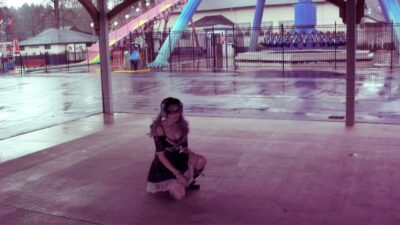
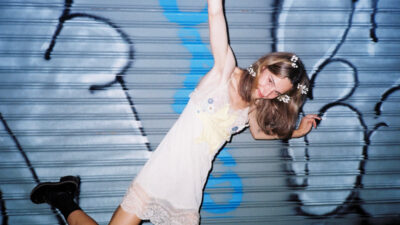
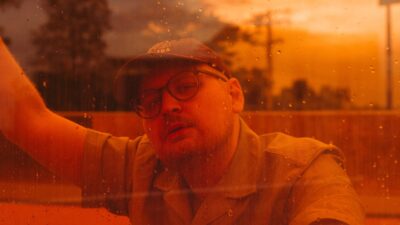
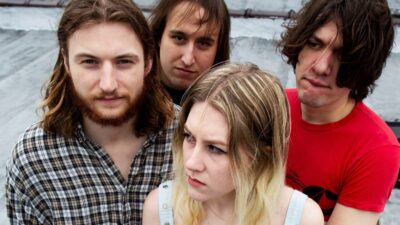

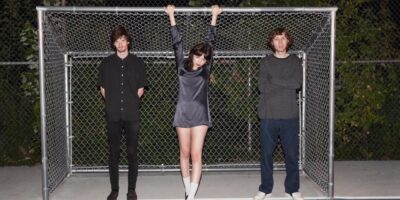

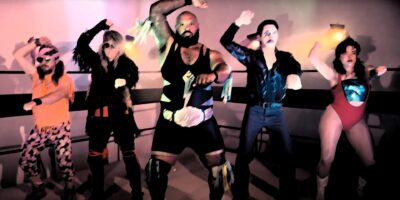
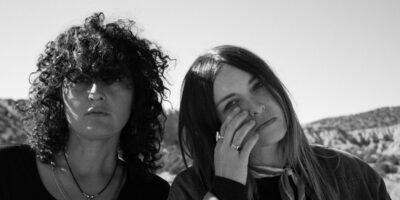
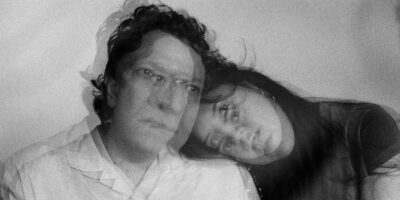




Comments